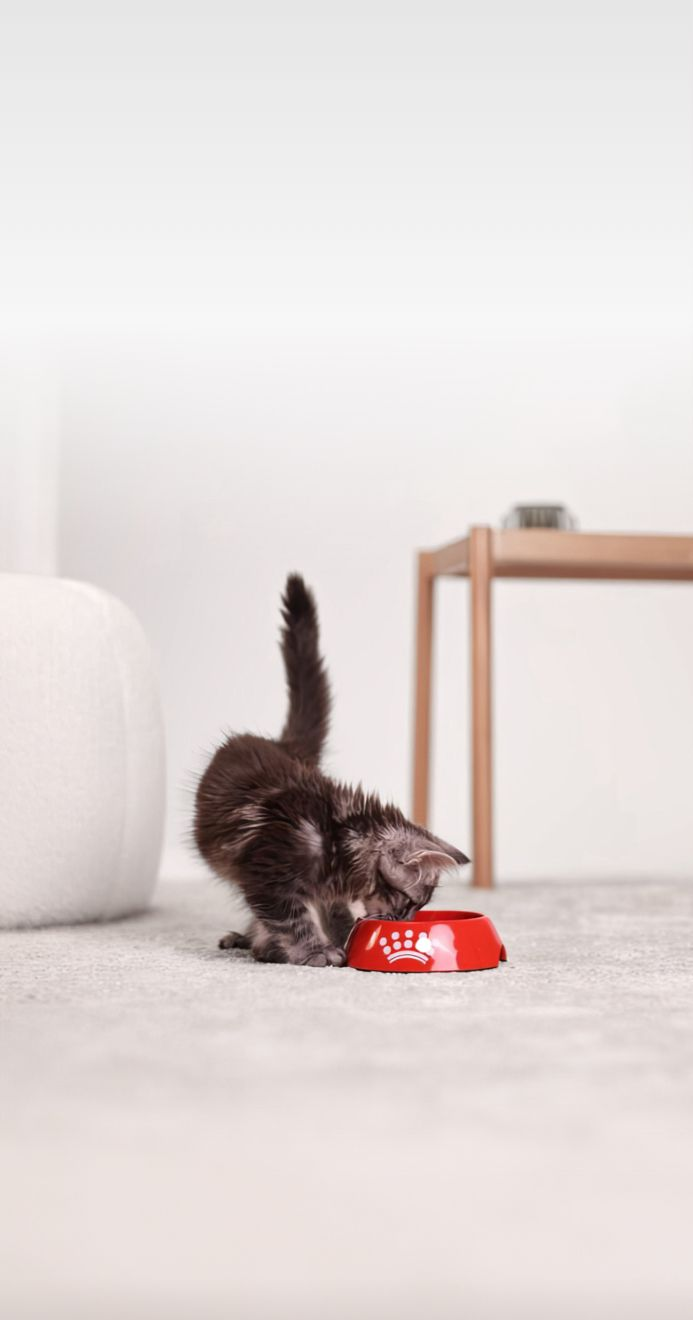Kitten feeding and nutrition
Sign up to receive R200 off your next Royal Canin Kitten purchase!
Kittens need different food from adult cats
As kittens are growing rapidly, and their digestive and immune systems are developing slowly, they have very specific nutritional needs that are different from adult cats. In particular, kittens need a diet with a higher energy and protein content, plus immune-boosting nutrients and the right balance of vitamins and minerals.
Why your kitten's diet is so important
Birth to 4 months
4 to 12 months
Your kitten’s digestive and immune systems are strengthening but still fragile. Their growth rate and energy needs begin to slow, but they still need easily digestible food designed for developing kittens.
Adult cats
Birth to 4 months
4 to 12 months
Your kitten’s digestive and immune systems are strengthening but still fragile. Their growth rate and energy needs begin to slow, but they still need easily digestible food designed for developing kittens.
Adult cats
Nutrients for healthy growth
There are a range of vital nutrients that your kitten needs during the first months of life to aid growth and development. Kitten diets must provide enough energy and quality proteins to support growth, strengthen the immature immune system and be easily digestible. ROYAL CANIN® diets are nutritionally balanced to offer a complete tailored diet to meet the needs of kittens of all sizes, lifestyles and breeds.
Key nutrientsThe science behind ROYAL CANIN® kitten nutrition
Our Kitten Ranges

Find the right product
Answer questions about your pet
Get a tailored recommendation
Unlock your pet’s health follow up
Your kitten's feeding schedule
Before bringing your kitten home, check the food they’re used to and the quantity they’re fed daily. Any sudden dietary changes can upset your kitten’s stomach and they’ll adapt more easily to their new home if their food’s familiar.
Keep an eye on your kitten’s weight to ensure they’re neither losing weight nor becoming overweight – both of which can cause health issues. Follow the recommended feeding quantities on your kitten’s food packaging and contact your vet for advice if you’re concerned about their weight or growth.
There are three common feeding methods for kittens and cats.
- Self-service - This is the most natural style as, when cats have free access to food, they usually eat several small meals a day – as many as 16 in 24 hours. It’s suitable for kittens who can eat dry food and aren’t overweight or likely to overeat.
- Fractioned feeding - This is when you feed your kitten at specific times during the day. It’s not as well-suited to their natural grazing tendencies, so it’s best to divide their overall daily ration into smaller amounts offered several times a day.
- Combination feeding - For this feeding method, you provide kibbles on a self-service basis and wet food at set times. If you use this approach, it’s important to control the amount of food provided overall to prevent your kitten becoming overweight.
Create the right environment for feeding your kitten
Cats are very sensitive and a variety of factors can put them off their food. They prefer to eat somewhere calm, out of sight and with an easy escape route, and don’t like their food bowl being near their litter box. Keep your kitten’s food bowl away from their water bowl too to prevent the water becoming contaminated with food. And create their feeding area away from your own dining area so they’re not tempted to nibble at your meals.
Events such as strangers arriving, arguments, changes in lighting and sudden noises may all affect how much your kitten eats, so keep disturbances to a minimum.
How much should my kitten drink?
Why can mixed feeding be good for kittens?
Hydration
Two pouches of wet food a day can provide around 73% of your kitten’s recommended daily water intake.
Palatability
Our wet formulas are designed to be highly appealing to the fussiest of kittens.
Weight management
Wet food’s high moisture content means you can serve a larger portion for the same number of calories.
Dental hygiene
Dry kibbles can help to keep your kitten’s teeth clean thanks to the brushing effect on their teeth as they chew.
Natural grazing
Providing dry food to nibble on throughout the day enables your kitten to follow their natural instinct to eat several small meals daily.
When should I begin mixed feeding?
How to change your kitten’s food
Any sudden changes in diet can cause digestive upsets and may make your kitten wary of their food. So it’s important to introduce new foods slowly during a week-long transition – whether you’re switching to adult food, changing products or introducing mixed feeding.
How is the kitten food different to adult cat food?
Test your knowledge and find out how much you've learnt by taking our quiz
Start the quiz